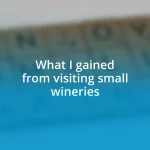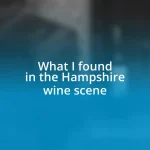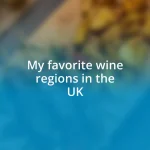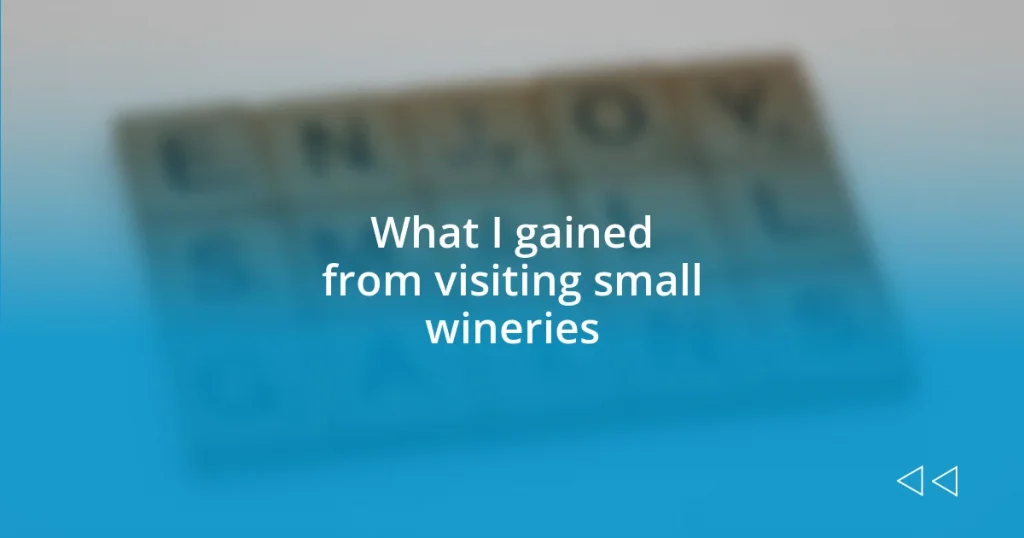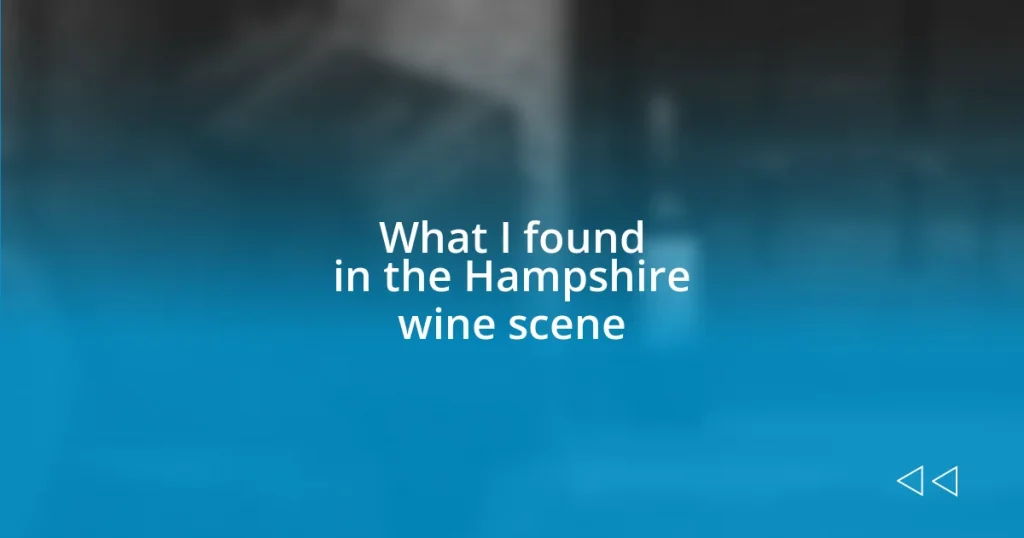Key takeaways:
- Visiting small wineries offers personal connections with winemakers, unique tastings, and insights into the winemaking process that deepen appreciation for the craft.
- Exploration of local wine varieties enhances the experience, revealing the cultural significance and unique flavors tied to the region’s terroir.
- Supporting small wineries promotes local economies and sustainable practices, connecting visitors to traditions and fostering a sense of community.
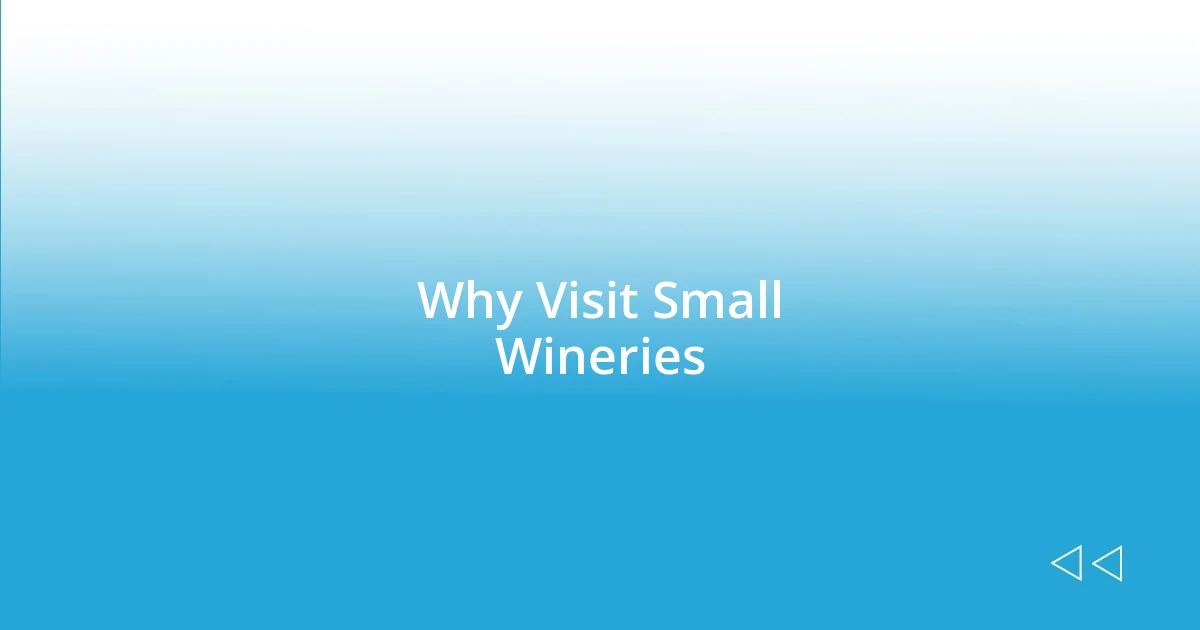
Why Visit Small Wineries
When I first visited a small winery, I was surprised by the level of personal attention I received. The owner shared stories of their winemaking journey, allowing me to see the passion behind each bottle. Isn’t it refreshing to connect directly with the people who produce the wine you enjoy?
Small wineries often produce unique varietals that you simply can’t find in larger, commercial vineyards. I remember tasting a limited edition blend that had hints of cherry and chocolate — a flavor profile that became an instant favorite of mine. Wouldn’t you agree that discovering something new adds a certain thrill to your wine journey?
Moreover, the ambiance in these intimate settings can’t be overstated. I’ll never forget sipping a crisp rosé while overlooking picturesque vines at sunset, surrounded by the sounds of nature. Have you ever had a moment where the scenery and the wine came together to create an unforgettable experience? That’s the beauty of visiting small wineries.
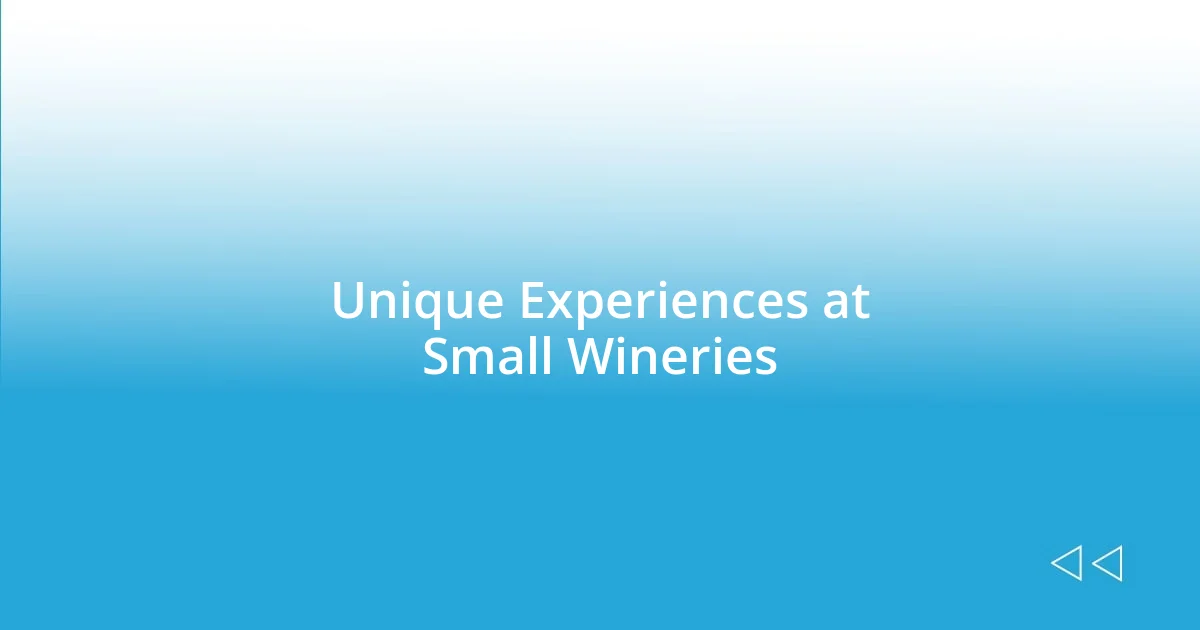
Unique Experiences at Small Wineries
Visiting small wineries offers experiences that go beyond just tasting wine. I remember arriving at a family-owned vineyard, where the owner greeted me like an old friend. They led me on a personal tour, showcasing their handcrafted methods, which made me feel truly connected to the process. It struck me how every bottle tells a story that reflects not just the terroir but also the personality of the winemaker.
Here are some unique experiences I enjoyed that you might also find noteworthy:
- Private Tastings: Engaging in one-on-one tastings with the owner allowed me to ask questions and learn about each wine’s history.
- Limited Releases: Discovering exclusive bottles that you can’t find elsewhere feels like unearthing a hidden gem; I still cherish the bottle I bought that day.
- Food Pairing Events: Participating in intimate pairing dinners led by talented chefs created a delightful fusion of flavors and insights.
- Hands-On Workshops: I had the chance to stomp grapes, which was messy yet incredibly fun and made me appreciate the winemaking process even more.
- Gorgeous Settings: Each winery had stunning views, adding a magical backdrop that enhanced the overall experience, turning a simple tasting into a memorable occasion.
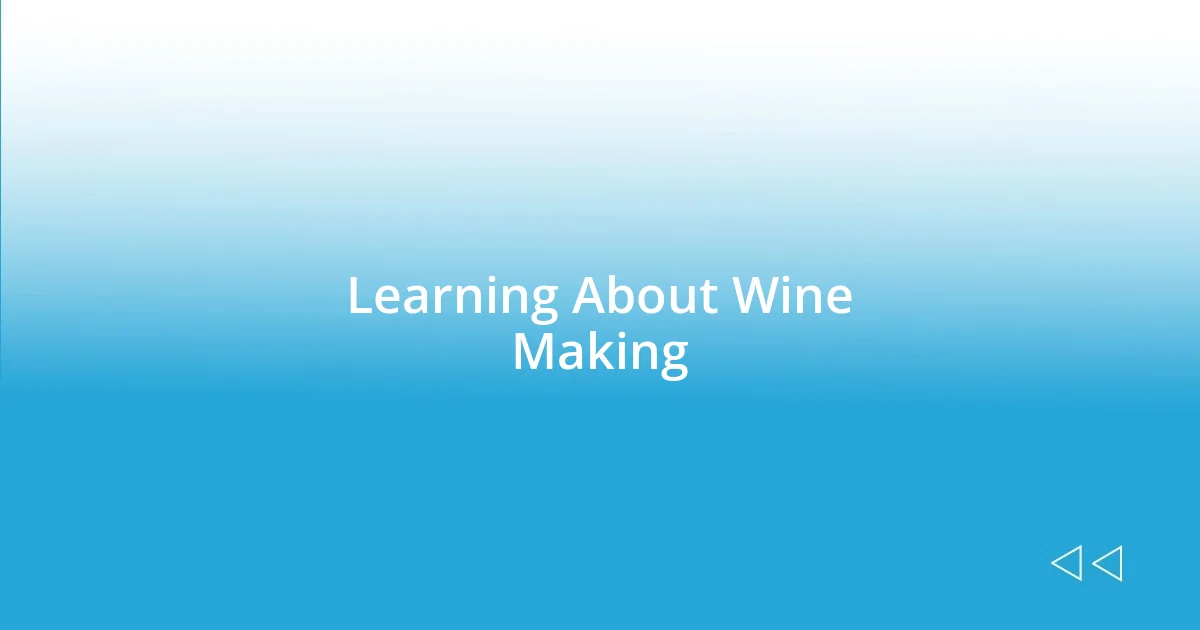
Learning About Wine Making
Learning about winemaking at small wineries is an experience that truly deepens your appreciation for the craft. One evening, while chatting with a passionate winemaker, I learned about the meticulous process of fermentation and aging. Hearing how small adjustments in temperature can influence the final taste was fascinating; it reminded me that every bottle carries a piece of this careful artistry, sort of like a painter’s brushstrokes on canvas.
During one visit, I participated in a hands-on activity where we measured the acidity of grape juice — a crucial step in determining the balance of a wine. It was enlightening to see how tiny differences could lead to very different flavor profiles. I remember feeling a sense of empowerment as I poured a drop to taste. It made me realize that winemaking is as much about science as it is about art. Have you ever felt that thrill of discovery?
Additionally, I found it remarkable how sustainable practices were often integrated into their winemaking methods. For example, one winemaker shared how they repurpose their grape pomace, which is the leftover skins and seeds, to create compost for their vineyards. This eco-conscious approach not only helped improve their soil but also connected me emotionally to the land the grapes were grown on. I left feeling like I was part of a larger story, one that respects both tradition and the environment.
| Winemaking Aspect | Insights Gained |
|---|---|
| Fermentation Process | Understanding temperature’s role in flavor development |
| Hands-on Activities | Measuring acidity enhanced my appreciation for balance in wine |
| Sustainable Practices | Learning about composting with grape byproducts highlighted eco-conscious winemaking |
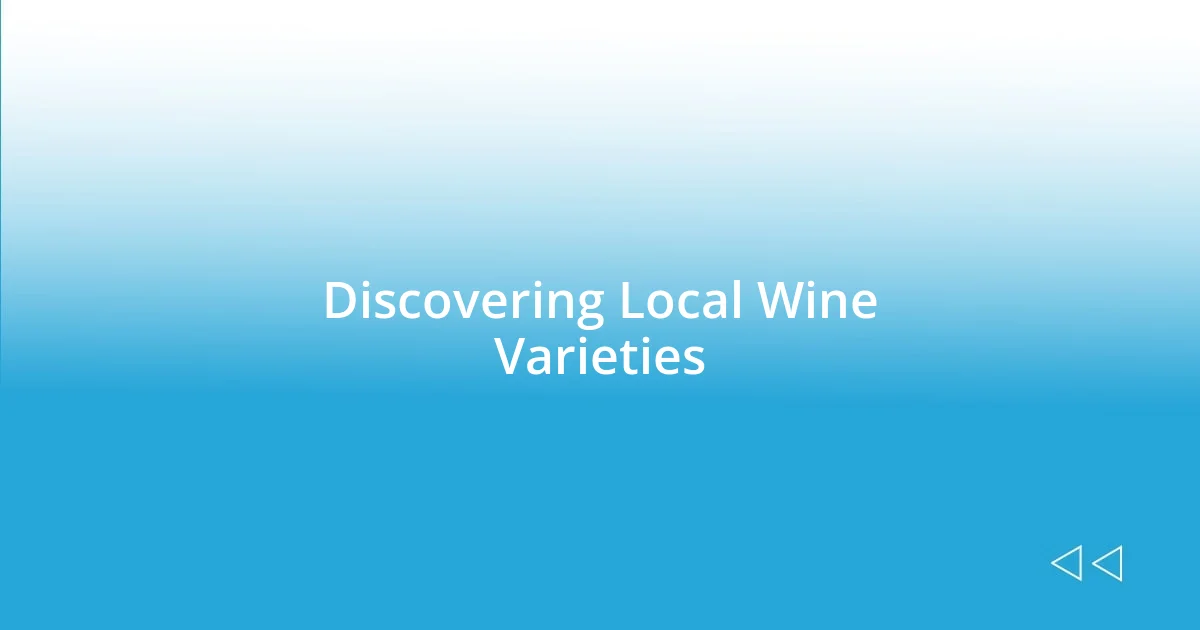
Discovering Local Wine Varieties
Exploring local wine varieties is like going on a treasure hunt, but instead of jewels, you find extraordinary flavors. I recall visiting a small winery tucked away in rolling hills, where I was introduced to a grape variety I’d never heard of before—Grüner Veltliner. The moment I took a sip, a wave of crisp, green apple notes danced on my palate. Have you ever stumbled upon a flavor that just takes you by surprise like that? It’s one of those moments that stays with you.
As I wandered through the vineyard, the winemaker shared fascinating stories about how the unique climate and soil composition shaped their wines. They highlighted how each vintage can differ significantly, not just in taste but also in the very essence of the wine. Listening to their passion made me more aware that these local varieties are not just beverages; they are reflections of a community and its land. I felt a connection to the place—every bottle was like a little piece of history waiting for me to discover.
On another visit, I participated in a tasting session that spotlighted lesser-known varietals. Each wine came with a story steeped in tradition and local heritage. The flavors were not just unique; they resonated with the culture of the region. I remember thinking how these wines, with their distinctive profiles, offered a taste of the location that was unlike anything I’d experienced elsewhere. When was the last time a glass of wine truly transported you? It’s a beautiful reminder of how wine connects us to the world around us.

Connecting with Winemakers Personally
Connecting with winemakers personally transforms an ordinary tasting into a memorable experience. I recall an afternoon spent with a winemaker in a cozy, sunlit tasting room. As we sipped a rich cabernet, he shared his journey, from struggling through his early years to mastering his craft. Listening to his passion and perseverance felt inspiring—it reminded me that every bottle tells a story, often one filled with hard-earned success and love.
During one visit, I was welcomed into a winemaker’s home for a casual lunch. Over homemade bread and local cheese, we discussed the nuances of their vineyard. I found myself captivated by how they spoke about the land as if it were a family member. This personal connection made me appreciate the wine on a deeper level, knowing it emerged from a place of care and dedication. Have you ever felt that warmth from someone who truly loves what they do? It’s a feeling that adds a unique richness to every sip.
Another fascinating moment was when a winemaker invited me to oversee a small blending experiment. Together, we combined different varietals to create a new blend, and it was exhilarating to taste the transformation with each adjustment. This hands-on experience made me realize how intimately tied wine is to its creator; each choice directly reflects their personality and vision. Isn’t it incredible to think that when we drink a glass of wine, we’re sharing a moment of creativity and individuality with the winemaker?
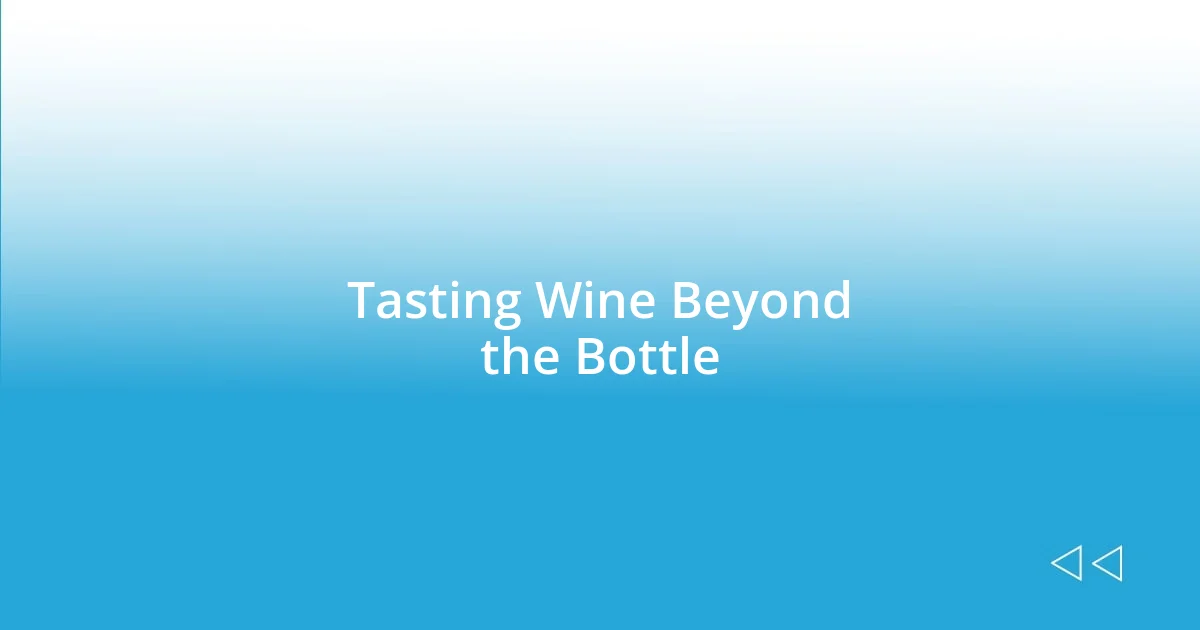
Tasting Wine Beyond the Bottle
I often find myself savoring the experience of tasting wine beyond just what’s in the glass. During one visit to a small winery, I joined a sensory workshop where we compared wines not just by tasting but by using our sense of smell and sight as well. I remember the stunning moment when, with my eyes closed, I could differentiate the subtle notes of oak and berry. Isn’t it fascinating how a simple swirl of wine can unlock layers of complexity and memories?
What truly struck me was when a winemaker introduced me to food pairings tailored to their wines. Together, we explored how the right cheese or charcuterie could amplify the wine’s character. I’ll never forget the explosion of flavor when the creamy brie met a vibrant Chardonnay. Have you ever experienced a pairing that elevated your entire perception of a wine? Moments like these highlight the artistry of winemaking and food pairing, bridging the gap between flavors and experiences in our lives.
Engaging with the environment where the grapes are grown also enhances my appreciation for the wine. I remember standing in the vineyard during harvest season, where I could taste the sun-soaked grapes right off the vine. The electric energy and anticipation in the air were palpable. How could such a simple act of tasting the raw fruit evoke such joy? It’s a reminder that every bottle holds not just wine but the spirit of the land and the people who nurture it.
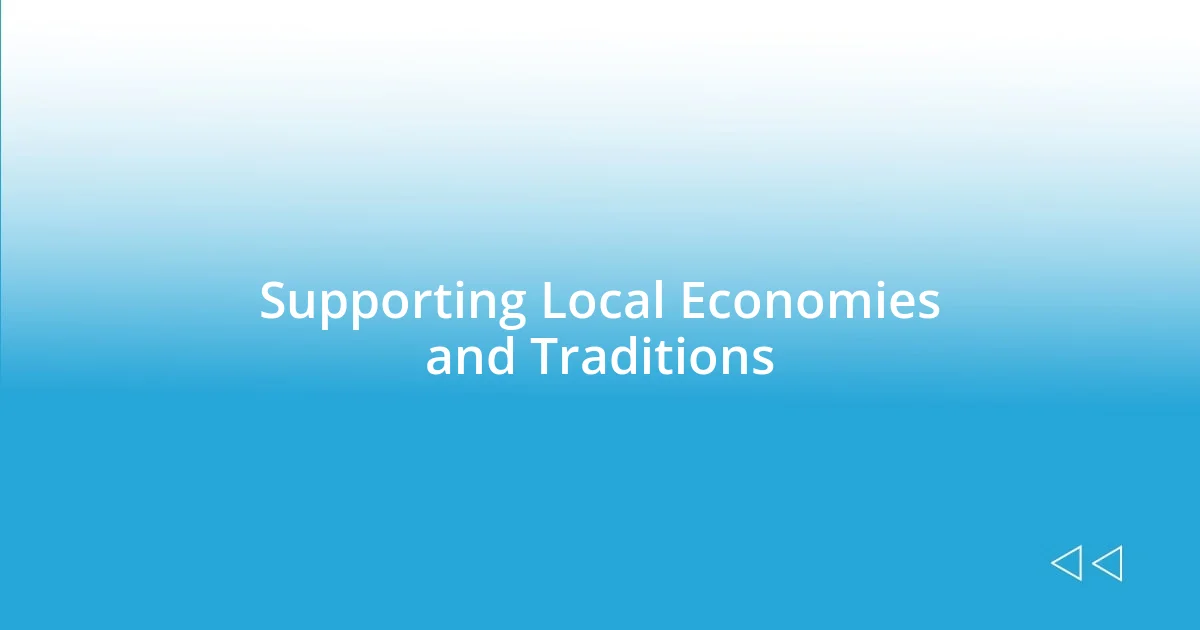
Supporting Local Economies and Traditions
Supporting local economies by visiting small wineries feels rewarding on multiple levels. I remember chatting with a winery owner about how their family business had been passed down through generations. They expressed gratitude for every visitor who brought support to the vineyard; it reminded me that by simply enjoying a glass of wine, I was participating in something much larger—sustaining a way of life that connects families to their land and heritage.
Each purchase not only adds to the winery’s economic vitality but also fosters community traditions. One afternoon, I attended a grape stomping festival, where locals came together to celebrate the harvest season. The laughter, music, and clinking of glasses resonated in the air, creating a vibrant atmosphere of unity. Have you ever felt that sense of belonging while surrounded by people who share your passion? Events like these illustrate how small wineries serve as cultural hubs, preserving customs while inviting newcomers to partake in their age-old rituals.
It’s incredible how supporting small wineries also promotes sustainable practices that can enhance the local economy. During a tour, a winemaker explained their commitment to organic farming and responsible land use, which not only benefits their grapes but also the entire ecosystem. Isn’t it inspiring to think that every bottle you enjoy could contribute to a healthier planet? Investing in these small-scale operations feels like a purposeful choice, where every sip is steeped in thoughtfulness and care for both the land and the community.

